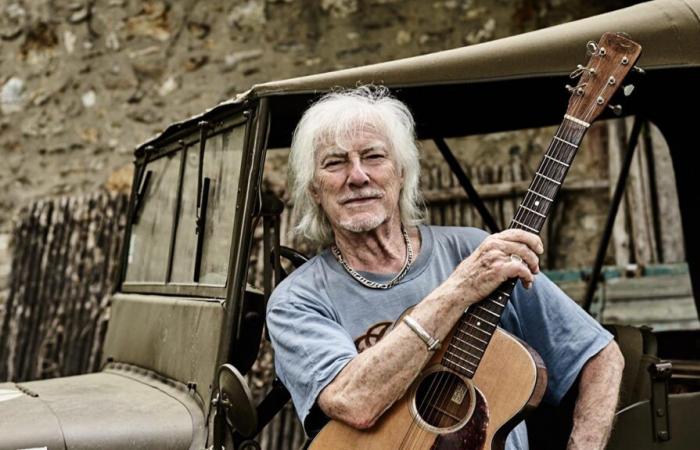Hugues Aufray, 60 years of career and more than 430 recorded songs, returns to the stage in the fall of 2024.
Among his successes, standards that have crossed generations and that the artist promises to sing once again on stage. But also slightly less known titles that he wants to highlight.
Between two dates, he answered questions on the phone from The New Central West Republic.
Is the stage a special place for you?
Hugues Aufray: “The stage is like the land for the farmer. This is where he grows his cabbages, his vines or walks his cows and sheep. The stage is where everything happens, because there is the audience.
And when we sing, we can say whatever we want, we always sing for others. Singing is seeing the happiness we bring to people.
It's a bit like when you play Basque pelota. You throw your ball against a wall and the wall throws the ball back to you.
When you sing on stage, you send something to the audience and they send you back. If he likes it, he returns his warmth, his love. The artist's happiness is born from this return. So without the scene there is no return. If we sing in a vacuum, it is a great misfortune. »
“Hope is the only thing to fight against despair”
What do you want to say to the public today?
“Given the very serious situation in the world, there is cause for concern. There is a climate change in the world. But I think this is not the result of human industrial activity (1).
The industrialization of humanity causes pollution. Pollution is filth. People who throw their bottles in the fields or in the sea, plastic bottles, fumes, artificial things… it changes the environment.
When we see the monstrous floods, the monstrous fires, it’s horrible. It is easily as serious, if not more serious, than wars. We are happy when wars stop. And there, we are not sure that the floods will stop.
So the artist on stage that I am tries to sing songs that give people hope. I think hope is the only thing to combat despair. »
Do you have any favorite songs or songs that you can't help but sing on stage?
“I'm lucky to have never written songs that are unhealthy or that can't be sung today.
This is what differentiates me from some, particularly in rock'n'roll, who took pleasure in developing subversive, complex things, and which pushed people to take drugs.
I admit that I have never taken drugs. I haven't drunk alcohol for a long time. Even today, some fill large stadiums but these are things that will go out of fashion.
I have songs that are perhaps less successfully, as they say in English, less popular than others. “Lighting the fire” is not my thing (sung by Johnny Halliday). I would like you to put out the fire! »
What does it mean to you that almost all generations of schoolchildren learn “Santiano” at some point in their school career?
“It’s a great success, because it’s a song that I brought back from the United States, but with another text. I made it a song of hope. Laurent Voulzy made a very different version of Santiano, full of nostalgia.
I actually have a song about an immigrant who leaves his country to go to the United States. “We will go to San Francisco” to find work, to be happy, to found families, to found a society, a world…
Children who sing “Santiano” today everyone doesn't know who I am and where this song comes from. But she is totally positive and not aggressive. »
Do you still have as much fun singing it?
“It’s the song that dominates my career. But it's like night and day. Night exists because day exists.
Santiano is an activist song. But there is another song, it’s the one that Georges Brassens loved in my repertoire. He confided to his secretary that it was a song he would have liked to write.
It is “The Little Gray Donkey”. It makes children cry but I decided, to please an Alsatian priest, to add a verse (2). And I added it in a few minutes.
He asked me why I made children cry with Céline, with Stewball or Goodbye, Mr. Professor… but I answered that children cry because they are sensitive. And I don't make them cry for bad causes. »
What are the songs you're writing about at the moment?
“I just told you: hope. I only have one word to say to people. You have no choice, you must believe in hope.
Hope shines, it's the light in the night. On my Facebook page, I said that I would like to meet Tony Estanguet to explain to him that I would like to carry the flame of hope. I'm a fan of wearing it everywhere because it glows in the dark. »
Do you recognize yourself in certain artists of the new generation?
“Unfortunately, no. I'll tell you, I've never been a scout in my life. But I think that scouting is what young people are missing now.
Because scouting is something totally awesome. Robert Baden-Powell (the founder of scouting) called it the school of hope. The word scout comes from the old French “escouter”, that is to say to listen to nature, to the words of animals, to the words of the tide, the waves, the wind… Baden Powell, c It was hope and teaching children to live in nature and share with respect for their neighbors.
Today, churches are burned and robbed (3). I am not at all practicing but I am a believer. If Protestant temples or mosques were robbed, I would be shocked. We must respect the places where man tries to translate his need for transcendence.
There are young singers that I like, I think that young people today have a lot of talent but unfortunately they are not the ones we see the most on television. And they are not always those who fill the Stade de France. »
(1) There is a consensus within the global scientific community (tens of thousands of experts) which proves the impact of human activity on global warming and in particular its acceleration. The 6e IPCC report recalls in particular that greenhouse gas emissions due to human activities have warmed the climate at an unprecedented rate: the temperature of the surface of the globe has risen by 1.1°C compared to the pre-industrial period.
(2) Inconsolable children of grace weep no more; In a modest stable your donkey has returned; On this Christmas night, venerate the naked child; Warm the little Jesus in his crib; Warm the little Jesus in his crib.
(3) According to a parliamentary report by deputies Florennes and Mendes on anti-religious acts, published in 2021, France has identified 1,659 anti-religious acts, 52% of which are anti-Christian. And among these, 92% are linked to attacks on places of worship (752 attacks out of the 46,000 places of worship identified). It also mentions 284 attacks on the property of the Jewish community and 107 attacks against mosques and Muslim cultural centers.






